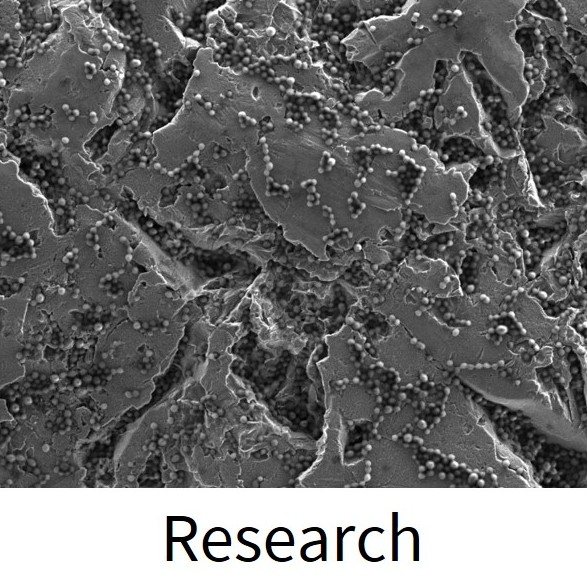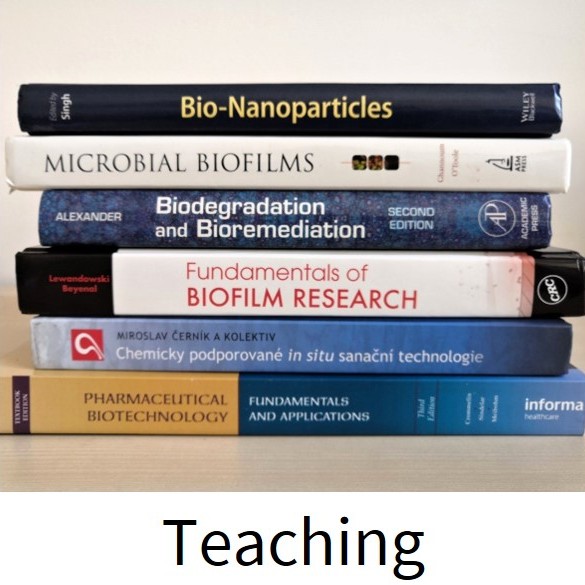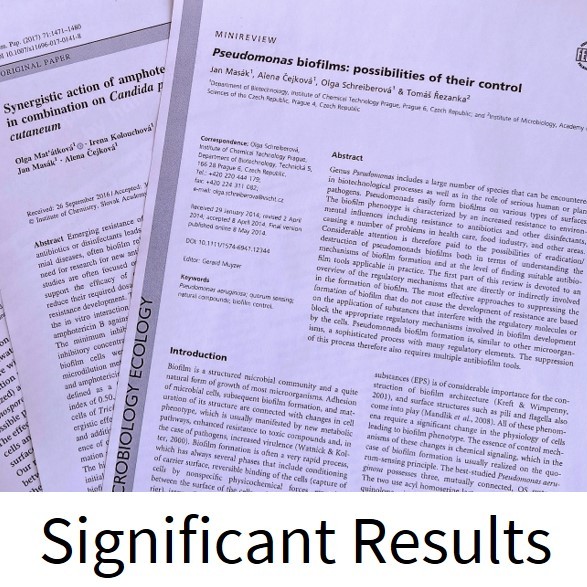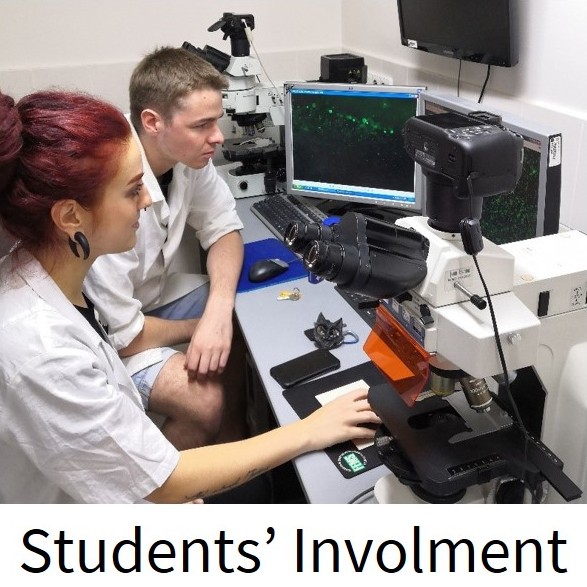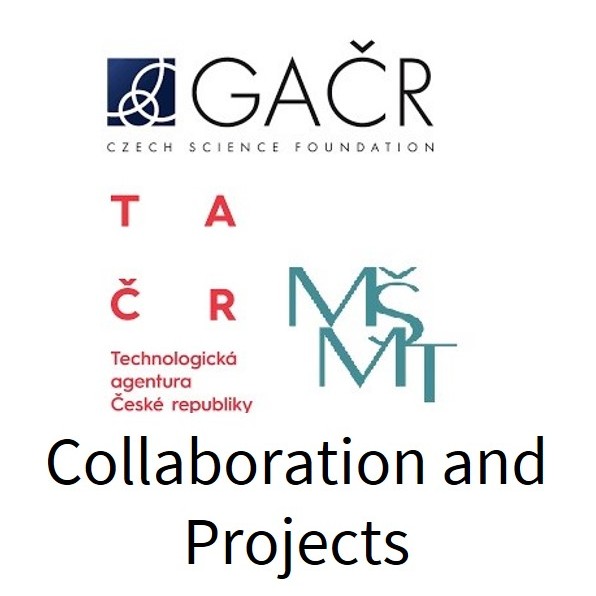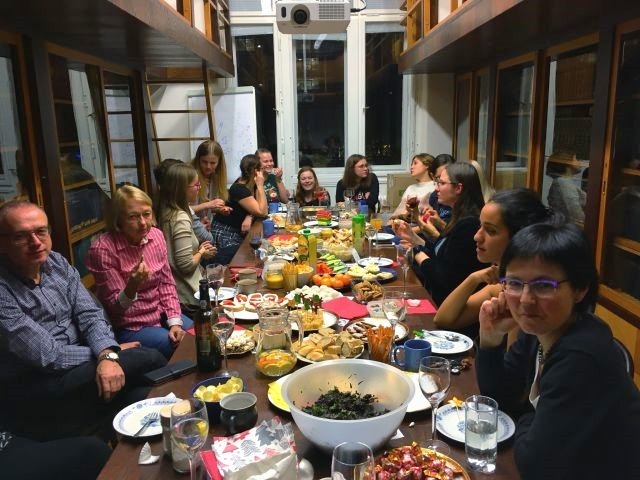stdClass Object
(
[nazev] => Department of Biotechnology
[adresa_url] =>
[api_hash] =>
[seo_desc] =>
[jazyk] =>
[jednojazycny] =>
[barva] =>
[indexace] => 1
[obrazek] =>
[ga_force] =>
[cookie_force] =>
[secureredirect] =>
[google_verification] =>
[ga_account] =>
[ga_domain] =>
[ga4_account] => G-VKDBFLKL51
[gtm_id] =>
[gt_code] =>
[kontrola_pred] =>
[omezeni] => 0
[pozadi1] =>
[pozadi2] =>
[pozadi3] =>
[pozadi4] =>
[pozadi5] =>
[robots] =>
[htmlheaders] =>
[newurl_domain] => 'ub.vscht.cz'
[newurl_jazyk] => 'en'
[newurl_akce] => '[en]'
[newurl_iduzel] =>
[newurl_path] => 8548/5338/5340
[newurl_path_link] => Odkaz na newurlCMS
[iduzel] => 5340
[platne_od] => 31.10.2023 17:10:00
[zmeneno_cas] => 31.10.2023 17:10:18.371543
[zmeneno_uzivatel_jmeno] => Jan Kříž
[canonical_url] =>
[idvazba] => 6020
[cms_time] => 1714977494
[skupina_www] => Array
(
)
[slovnik] => stdClass Object
(
[logo_href] => /
[logo] =>  [social_fb_odkaz] =>
[social_tw_odkaz] =>
[social_yt_odkaz] =>
[paticka_budova_a_nadpis] => BUILDING A
[paticka_budova_a_popis] => Rector,
Department of Communications,
Department of Education,
FCT Dean’s Office,
Centre for Information Services
[paticka_budova_b_nadpis] => BUILDING B
[paticka_budova_b_popis] => Department of R&D, Dean’s Offices:
FET,
FFBT,
FCE,
Computer Centre,
Department of International Relations,
Bursar
[paticka_budova_c_nadpis] => BUILDING C
[paticka_budova_c_popis] => Crèche Zkumavka,
General Practitioner,
Department of Economics and Management,
Department of Mathematics
[paticka_budova_1_nadpis] => NATIONAL LIBRARY OF TECHNOLOGY
[paticka_budova_1_popis] =>
[paticka_budova_2_nadpis] => CAFÉ CARBON
[paticka_budova_2_popis] =>
[paticka_adresa] => UCT Prague
[social_fb_odkaz] =>
[social_tw_odkaz] =>
[social_yt_odkaz] =>
[paticka_budova_a_nadpis] => BUILDING A
[paticka_budova_a_popis] => Rector,
Department of Communications,
Department of Education,
FCT Dean’s Office,
Centre for Information Services
[paticka_budova_b_nadpis] => BUILDING B
[paticka_budova_b_popis] => Department of R&D, Dean’s Offices:
FET,
FFBT,
FCE,
Computer Centre,
Department of International Relations,
Bursar
[paticka_budova_c_nadpis] => BUILDING C
[paticka_budova_c_popis] => Crèche Zkumavka,
General Practitioner,
Department of Economics and Management,
Department of Mathematics
[paticka_budova_1_nadpis] => NATIONAL LIBRARY OF TECHNOLOGY
[paticka_budova_1_popis] =>
[paticka_budova_2_nadpis] => CAFÉ CARBON
[paticka_budova_2_popis] =>
[paticka_adresa] => UCT Prague
Technická 5
166 28 Prague 6 – Dejvice
IČO: 60461373 / VAT: CZ60461373
Czech Post certified digital mail code: sp4j9ch
Copyright: UCT Prague 2017
Information provided by the Department of International Relations and the Department of R&D. Technical support by the Computing Centre.
[paticka_odkaz_mail] => mailto:Martin.Halecky@vscht.cz
[social_fb_title] =>
[social_tw_title] =>
[social_yt_title] =>
[google_search] => 001523547858480163194:u-cbn29rzve
[drobecky] => You are here: UCT Prague – FFBT – UB
[autor] => Author
[aktualizovano] => Updated
[paticka_mapa_alt] =>
[intranet_odkaz] => http://intranet.vscht.cz/
[intranet_text] => Intranet
[den_kratky_4] => Thurs
[novinky_kategorie_1] => UCT Events
[novinky_kategorie_2] => Important Dates
[novinky_kategorie_3] => Student Events
[novinky_kategorie_4] => Fun
[novinky_kategorie_5] => Science
[novinky_archiv_url] => /news
[novinky_servis_archiv_rok] => Annual Archive
[novinky_servis_nadpis] => News Settings
[novinky_dalsi] => More News
[den_kratky_5] => Fri
[archiv_novinek] => Annual Archive
[logo_mobile_href] => /
[logo_mobile] =>  [mobile_over_nadpis_menu] => Menu
[mobile_over_nadpis_search] => Search
[mobile_over_nadpis_jazyky] => Languages
[mobile_over_nadpis_login] => Login
[menu_home] => Homepage
[zobraz_desktop_verzi] => switch to desktop version
[novinky_archiv] => News Archive
[zobraz_mobilni_verzi] => switch to mobile version
[zobrazit_kalendar] => Read Calendar
[paticka_mapa_odkaz] =>
[nepodporovany_prohlizec] => For full access, please use different browser.
[den_kratky_2] => Tue
[preloader] => Wait a second...
[den_kratky_6] => Sat
[den_kratky_1] =>
[den_kratky_0] =>
[den_kratky_3] =>
[social_in_odkaz] =>
[hledani_nadpis] => hledání
[hledani_nenalezeno] => Nenalezeno...
[hledani_vyhledat_google] => vyhledat pomocí Google
[social_li_odkaz] =>
)
[poduzel] => stdClass Object
(
[5343] => stdClass Object
(
[obsah] =>
[poduzel] => stdClass Object
(
[7900] => stdClass Object
(
[obsah] =>
[iduzel] => 7900
[canonical_url] => //ub.vscht.cz
[skupina_www] => Array
(
)
[url] => /[menu-top]
[sablona] => stdClass Object
(
[class] => api_kalendar
[html] =>
[css] =>
[js] =>
[autonomni] => 1
)
)
[7902] => stdClass Object
(
[obsah] =>
[iduzel] => 7902
[canonical_url] => //ub.vscht.cz
[skupina_www] => Array
(
)
[url] => /[menu-jazyky]
[sablona] => stdClass Object
(
[class] => api_kalendar
[html] =>
[css] =>
[js] =>
[autonomni] => 1
)
)
[7901] => stdClass Object
(
[obsah] =>
[iduzel] => 7901
[canonical_url] => //ub.vscht.cz
[skupina_www] => Array
(
)
[url] => /[menu-main]
[sablona] => stdClass Object
(
[class] => api_kalendar
[html] =>
[css] =>
[js] =>
[autonomni] => 1
)
)
)
[iduzel] => 5343
[canonical_url] => //ub.vscht.cz/5343
[skupina_www] => Array
(
)
[url] => /[en]/5343
[sablona] => stdClass Object
(
[class] => api_kalendar
[html] =>
[css] =>
[js] =>
[autonomni] => 1
)
)
[5344] => stdClass Object
(
[obsah] =>
[poduzel] => stdClass Object
(
[7908] => stdClass Object
(
[nazev] =>
[seo_title] =>
[seo_desc] =>
[autor] =>
[autor_email] =>
[obsah] =>
[iduzel] => 7908
[canonical_url] => //ub.vscht.cz/home
[skupina_www] => Array
(
)
[url] => /home
[sablona] => stdClass Object
(
[class] => stranka_novinky
[html] =>
[css] =>
[js] =>
[autonomni] => 1
)
)
[7909] => stdClass Object
(
[nazev] => Department of Biotechnology
[seo_title] => Department of Biotechnology
[seo_desc] =>
[autor] =>
[autor_email] =>
[obsah] =>
[mobile_over_nadpis_menu] => Menu
[mobile_over_nadpis_search] => Search
[mobile_over_nadpis_jazyky] => Languages
[mobile_over_nadpis_login] => Login
[menu_home] => Homepage
[zobraz_desktop_verzi] => switch to desktop version
[novinky_archiv] => News Archive
[zobraz_mobilni_verzi] => switch to mobile version
[zobrazit_kalendar] => Read Calendar
[paticka_mapa_odkaz] =>
[nepodporovany_prohlizec] => For full access, please use different browser.
[den_kratky_2] => Tue
[preloader] => Wait a second...
[den_kratky_6] => Sat
[den_kratky_1] =>
[den_kratky_0] =>
[den_kratky_3] =>
[social_in_odkaz] =>
[hledani_nadpis] => hledání
[hledani_nenalezeno] => Nenalezeno...
[hledani_vyhledat_google] => vyhledat pomocí Google
[social_li_odkaz] =>
)
[poduzel] => stdClass Object
(
[5343] => stdClass Object
(
[obsah] =>
[poduzel] => stdClass Object
(
[7900] => stdClass Object
(
[obsah] =>
[iduzel] => 7900
[canonical_url] => //ub.vscht.cz
[skupina_www] => Array
(
)
[url] => /[menu-top]
[sablona] => stdClass Object
(
[class] => api_kalendar
[html] =>
[css] =>
[js] =>
[autonomni] => 1
)
)
[7902] => stdClass Object
(
[obsah] =>
[iduzel] => 7902
[canonical_url] => //ub.vscht.cz
[skupina_www] => Array
(
)
[url] => /[menu-jazyky]
[sablona] => stdClass Object
(
[class] => api_kalendar
[html] =>
[css] =>
[js] =>
[autonomni] => 1
)
)
[7901] => stdClass Object
(
[obsah] =>
[iduzel] => 7901
[canonical_url] => //ub.vscht.cz
[skupina_www] => Array
(
)
[url] => /[menu-main]
[sablona] => stdClass Object
(
[class] => api_kalendar
[html] =>
[css] =>
[js] =>
[autonomni] => 1
)
)
)
[iduzel] => 5343
[canonical_url] => //ub.vscht.cz/5343
[skupina_www] => Array
(
)
[url] => /[en]/5343
[sablona] => stdClass Object
(
[class] => api_kalendar
[html] =>
[css] =>
[js] =>
[autonomni] => 1
)
)
[5344] => stdClass Object
(
[obsah] =>
[poduzel] => stdClass Object
(
[7908] => stdClass Object
(
[nazev] =>
[seo_title] =>
[seo_desc] =>
[autor] =>
[autor_email] =>
[obsah] =>
[iduzel] => 7908
[canonical_url] => //ub.vscht.cz/home
[skupina_www] => Array
(
)
[url] => /home
[sablona] => stdClass Object
(
[class] => stranka_novinky
[html] =>
[css] =>
[js] =>
[autonomni] => 1
)
)
[7909] => stdClass Object
(
[nazev] => Department of Biotechnology
[seo_title] => Department of Biotechnology
[seo_desc] =>
[autor] =>
[autor_email] =>
[obsah] => 
As the Department name indicates, the Department of Biotechnology is engaged in education, science, and consultancy activities in biotechnologies from the chemical, technical, and engineering points of view. The Department's core activities are in brewing, biotechnologies for environmental protection, alternative fuel production, issues of biofilms, and the production of biodetergents and enzymes.
[iduzel] => 7909
[canonical_url] => //ub.vscht.cz/department
[skupina_www] => Array
(
)
[url] => /department
[sablona] => stdClass Object
(
[class] => stranka_submenu
[html] =>
[css] =>
[js] =>
[autonomni] => 1
)
)
[17822] => stdClass Object
(
[nazev] => Study
[seo_title] => Study
[seo_desc] =>
[autor] =>
[autor_email] =>
[perex] =>
[ikona] =>
[obrazek] =>
[obsah] => Our Department offers higher education in fields of traditional as well as modern biotechnologies, e.g. chemical and pharmaceutical industries and environmental protection, and bioengineering. The Department is accredited to provide three-year Bachelor programmes, two-year Master programmes, and Doctoral programmes.

Interested students can participate in scientific and research work at the Department from the outset of their studies.
Given a wide range of contacts in Europe and worldwide, it is possible to apply for study or research fellowships.
[iduzel] => 17822
[canonical_url] => //ub.vscht.cz/study
[skupina_www] => Array
(
)
[url] => /study
[sablona] => stdClass Object
(
[class] => stranka_submenu
[html] =>
[css] =>
[js] =>
[autonomni] => 1
)
)
[17821] => stdClass Object
(
[nazev] => Research
[seo_title] => Research
[seo_desc] =>
[autor] =>
[autor_email] =>
[perex] =>
[ikona] =>
[obrazek] =>
[obsah] => 
Research focuses on biotechnological processes in their entireties—including the behavior of biological agents; the study of unit operations which are involved in modern biotechnology, including downstream processing; aspects of bioengineering and the modeling and simulation of bioprocesses; the application of biotechnological processes in the food, pharmaceutical, biotechnology and chemical industries; and environmental protection.
[iduzel] => 17821
[canonical_url] => //ub.vscht.cz/research
[skupina_www] => Array
(
)
[url] => /research
[sablona] => stdClass Object
(
[class] => stranka_submenu
[html] =>
[css] =>
[js] =>
[autonomni] => 1
)
)
[17820] => stdClass Object
(
[nazev] => Cooperation and Partners
[seo_title] => Cooperation and Partners
[seo_desc] =>
[autor] =>
[autor_email] =>
[perex] =>
[ikona] =>
[obrazek] =>
[obsah] => 
Collaboration with domestic and international industrial and research partners on a wide range of joint projects involving basic and applied research, scaling of technologies and reactors, solution of technological problems by form of grants or cooperation contracts is an essential part of our scientific and research work. An integral part of this cooperation is the involvement of students of all learning levels in such projects to improve their knowledge and skills.
[iduzel] => 17820
[canonical_url] => //ub.vscht.cz/cooperation-partners
[skupina_www] => Array
(
)
[url] => /cooperation-partners
[sablona] => stdClass Object
(
[class] => stranka_submenu
[html] =>
[css] =>
[js] =>
[autonomni] => 1
)
)
[24134] => stdClass Object
(
[obsah] =>
[iduzel] => 24134
[canonical_url] =>
[skupina_www] => Array
(
)
[url] =>
[sablona] => stdClass Object
(
[class] =>
[html] =>
[css] =>
[js] =>
[autonomni] =>
)
)
)
[iduzel] => 5344
[canonical_url] => //ub.vscht.cz/5344
[skupina_www] => Array
(
)
[url] => /[en]/5344
[sablona] => stdClass Object
(
[class] => api_kalendar
[html] =>
[css] =>
[js] =>
[autonomni] => 1
)
)
)
[sablona] => stdClass Object
(
[class] => web
[html] =>
[css] =>
[js] =>
[autonomni] => 1
)
[api_suffix] =>
)
DATA
stdClass Object
(
[nazev] => Laboratory of Applied Biology
[seo_title] => Laboratory of Applied Biology
[seo_desc] =>
[autor] =>
[autor_email] =>
[obsah] => 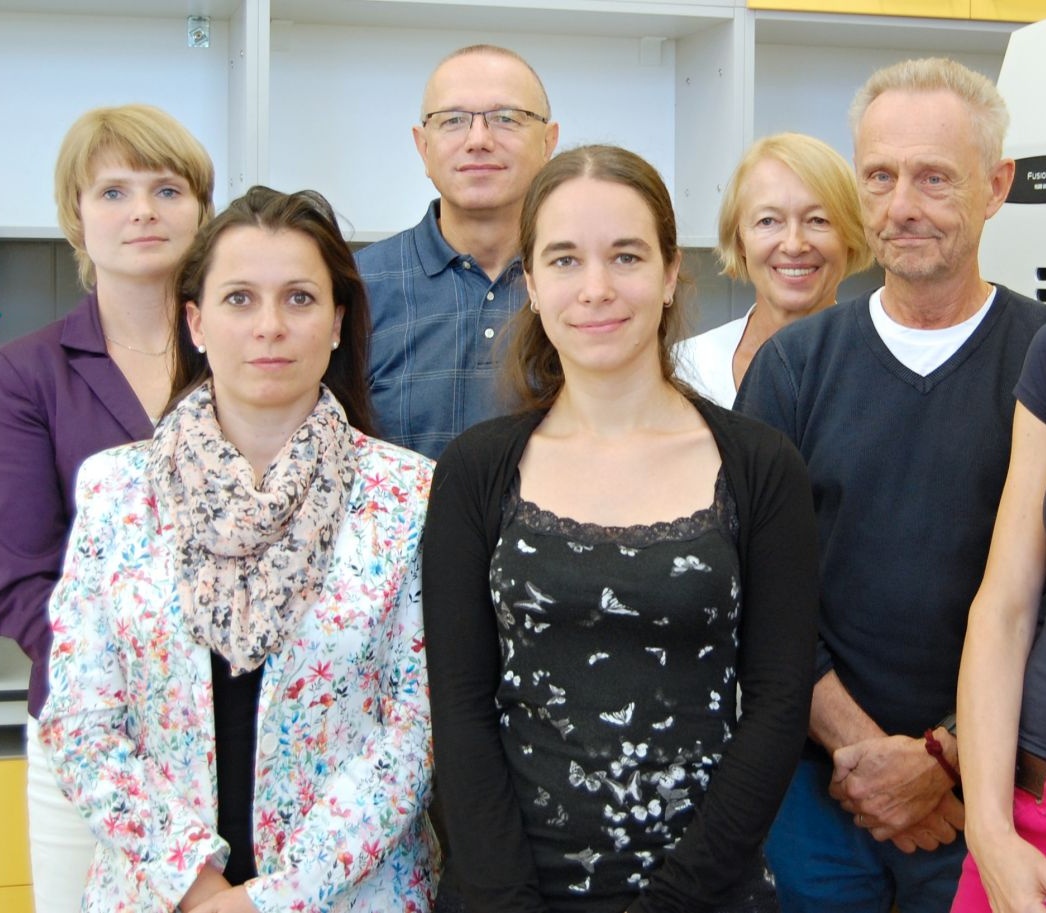
- Jan Masák, Prof., PhD (contact person)
- Alena Čejková, Prof., PhD
- Vladimír Jirků, Prof., DSc
- Irena Kolouchová, Assoc. Prof., PhD
- Olga Maťátková, Assoc. Prof., PhD
- Eva Vaňková, PhD
- Jana Michailidu, PhD
- Anna Miškovská, MSc (doctoral student)
- Dominik Maršík, MSc (doctoral student)
- Markéta Kulišová, MSc (doctoral student)
- Elizaveta Timkina, MSc (doctoral student)
- Undergraduate students
We are focused on a variety of topics, which have a common denominator: trying to understand the underlying mechanisms of biological activity of microorganisms and microbial communities. The main goal is to apply the combined knowledge of biotechnology and medicine to engineer inhibitors of microbial growth or finding new ways to inhibit biofilm formation, protect the environment or utilize new biologically active substances. Another topic of interest of our laboratory is nanoparticles: we study both their production by physicochemical or biological means and their antimicrobial activity. An inherent part of our work is cooperation with the industry, particularly wine industry, with a focus on plant waste valorisation. Our laboratory is well equipped for performing microbiological and biochemical techniques, as well as image analysis. We also have access to analytical equipment such as transmission electron microscope, confocal microscope or mass-spectrometer.

Research and industrial partners
- Dekonta, Inc., Czech Republic
- Aquatest, Inc., Czech Republic
- MikroChem LKT, Ltd., Czech Republic
- EPS, Ltd., Czech Republic
- Technical University of Liberec, Czech Republic
- Institute of Microbiology of the CAS, v. v. i., CzechRepublic
- Institute of Organic Chemistry and Biochemistry of the CAS, v. v. i., CzechRepublic
- University of Insubria, Italy
- Nové Vinařství, Inc., Czech Republic
- Vinselekt Michlovský, Inc, Czech Republic
- Vinné sklepy Kutná Hora Ltd., Czech Republic
Research projects
Ecology of extremophilic microorganisms in Czech spring waters of cultural heritage significance, 18-00036S
Funding provider: Czech Science Foundation (GACR)
Researcher in Charge: Assoc. Prof. Ing. Ondřej Uhlík PhD, Department of Biochemistry and Microbiology, UCT Prague
Co-researcher: Assoc. Prof. Irena Kolouchová PhD, Department of Biotechnology, UCT Prague
Period: 2018-2020
Relationship between Vitis vinifera L. endophytes, and its metabolome, 18-26463S
Funding provider: Czech Science Foundation (GACR)
Researcher in Charge: Assoc. Prof. Ing. Milena Stránská PhD, Department of Food Analysis and Nutrition, UCT Prague
Co-researcher: Assoc. Prof. Irena Kolouchová PhD, Department of Biotechnology, UCT Prague
Period: 2018-2020
Wine products with added value, TH03030271
Technology Agency of the Czech Republic (TAČR) – Program Epsilon
Applicant: Assoc. Prof. Irena Kolouchová, Ph.D., Department of Biotechnology, UCT Prague
Period: 2018-2021
Cooperation on the development of wines with heightened resveratrol content, 17/005/16220/564/000088
The State Agricultural Intervention Fund (SZIF)
Applicant: Nové vinařství, a.s.
Co-applicant: Department of Biotechnology, UCT Prague, Assoc. Prof. Irena Kolouchová, Ph.D.,
Period: 2018-2021
Research and development of excipients for plant nutrition and vitality, TH04030109
Technology Agency of the Czech Republic (TAČR) – Program Epsilon
Applicant: Assoc. Prof. Irena Kolouchová, Ph.D., Department of Biotechnology, UCT Prague
Period: 2019-2022
Christmas Party (2019)
International Conference on Chemical Technology in Mikulov (2019)
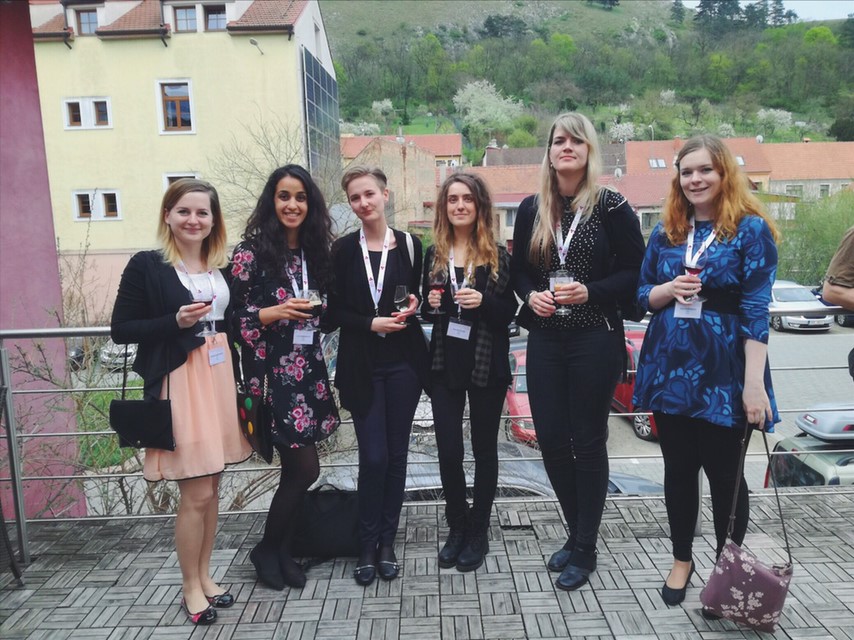
Bachelor programme:
- Biotechnology I
- Physiology of Industrial Microorganisms
Master programme:
- Applied Cell Biology
- Biochemistry of Secondary Metabolites
- Biotechnological Applications of Microorganisms
- Biotechnology in chemical and pharmaceutical production
- Environmental biotechnology
- Viticulture, production of non-alkoholic and low-alcoholic beverages
- Cultivation Techniques and Modeling of Bioprocesses
- Subjects with Individual Assignments:
- Biotechnology: Laboratory I, II
- Pharmaceutical Biotechnology: Laboratory I, II, III
- Biotechnology: Semestral Work
- Biotechnology: Seminar and Specialised Project
What you can learn in our lab
- Basic microbiology techniques: cultivation and analysis of microorganisms
- Working with microbial biofilms, their cultivation on various different materials (from polystyrene microtitre plates and titanium alloys used in medicine to packed columns and flow cell chambers) and the subsequent evaluation of biofilm formation or eradication under the influence of different antimicrobial agents
- Cultivation of extremophilic microorganisms focusing on their biotechnologically relevant characteristics (e.g. lipid production)
- Biosynthesis of nanoparticles (using plant extracts), their characterization and antimicrobial activity
Paldrychová M., Vaňková E., Scholtz V., Julák J., Sembolová E., Maťátková O., Masák J.: Effect of non-thermal plasma on AHL-dependent QS systems and biofilm formation in Pseudomonas aeruginosa: Difference between non-hospital and clinical isolates, AIP Advances 9, 055117, 2019 (on-line)
Gharwalova, L., Sigler, K., Dolezalova J., Masak, J., Rezanka, T., Kolouchova, I.: Resveratrol suppresses ethanol stress in winery and bottom brewery yeast by affecting superoxide dismutase, lipid peroxidation and fatty acid profile. World Journal of Microbiology and Biotechnology. 2017 DOI: 10.1007/s11274-017-2371-x. IF 1,658. (on-line)
Matatkova, O., Kolouchova, I., Kvasnickova. E., Jezdik, R., Masak, J., Cejkova, A.: Synergistic action of amphotericin B and rhamnolipid in combination on Candida parapsilosis and Trichosporon cutaneum. Chemical Papers. 71(8):1471-1480, 2017. IF 1,258. (on-line)
Pádrová K., Maťátková O., Šiková M., Füzik T., Masák J., Čejková A., Jirků V.: Mitigation of Fe0 nanoparticles toxicity to Trichosporon cutaneum by humic substances, New Biotechnology 33(1), 144-152, 2016 (on-line)
Kolouchova I., Sigler K., Schreiberova O., Masak J., Rezanka,T.: New yeast-based approaches in production of palmitoleic acid. Biosource technology 192, 726-734 (2015) ISSN: 0960-8524, IF = 4,494. (on-line)
Jirků V., Čejková A., Schreiberová O., Ježdík R., Masák J.: Multicomponent biosurfactants — A “ Green Toolbox” extension, Biotechnology Advances 33(6), 1272–1276 (2015) ISSN: 0734-9750, IF 8.905. (on-line)
[urlnadstranka] => [obrazek] => [poduzel] => Array ( ) [iduzel] => 52467 [canonical_url] => [skupina_www] => Array ( ) [url] => /research/groups/applied-biology/results [sablona] => stdClass Object ( [class] => stranka [html] => [css] => [js] => [autonomni] => 1 ) ) [52466] => stdClass Object ( [nazev] => Research [seo_title] => Research [seo_desc] => [autor] => [autor_email] => [obsah] =>Biofilms
Researchers: Jan Masák, Prof., PhD, Alena Čejková, Prof., PhD, Olga Maťátková, Assoc. Prof., PhD, Irena Kolouchová, Assoc. Prof., PhD, Eva Vaňková, PhD
Biofilms can be defined as structured communities of microorganisms colonizing solid abiotic surfaces, tissues, or phase interfaces, surrounded by matrix (EPS, extracellular polymeric substances) and exhibiting various distinct cell phenotypes. It is one of the most common forms of life for microorganisms. The presence of microorganisms in biofilms is the result of purposeful behaviour regulated at the level of intercellular communication based on the production and perception of signalling molecules. Microorganisms living in a biofilm have a different phenotype when compared to planktonic populations. This phenotype is characterized by increased resistance to toxic substances and generally towards the external environment, high production of extracellular polymeric compounds and significantly altered protein profiles. There is also a change in catabolism and anabolism. The biofilm formation ability is also a manifestation of virulence of the pathogenic microorganisms. Based on these principles, we explore the following topics:
- Biofilm preparation methodologies on different carriers and in different environmental conditions. Observing the properties of mature biofilms – metabolic activity, total biofilm biomass, EPS production, biofilm structure etc.
- Study of the anti-biofilm activity of natural substances that interfere with the regulation of biofilm formation (interference with microbial signalling molecules) or affect the stability of biofilm matrix (biologically active substances: rhamnolipids, etc.). Utilization of this knowledge to suppress microbial colonization of instruments or implants used in medicine.
- Study of virulence factor production in both planktonic and biofilm forming populations, searching for new methods of inhibition of virulence factor production.
- Study of the relationships between the presence and concentration of specific signalling molecules (especially acyl-homoserine lactones) and formation of bacterial biofilms and their stability.
- Study of metabolic pathways and increased resistance of biofilm populations enabling efficient decomposition of toxic substances in the environment.
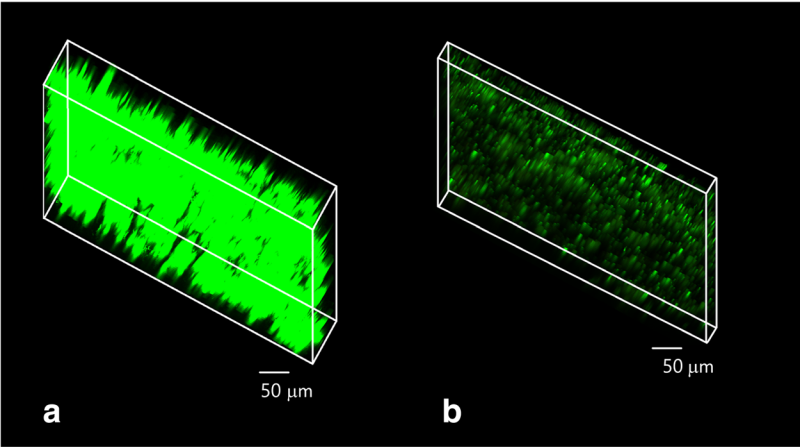
3D representation of Trichosporon cutaneum biofilm created using confocal microscopy: control (a), 160 mg/L of resveratrol (b).
Interaction of Nanoparticles and Microorganisms
Researchers: Jan Masák, Prof., PhD, Alena Čejková, Prof., PhD, Olga Maťátková, Assoc. Prof., PhD
Due to their size, nanoparticles have physicochemical properties that differ from their respective macroscopic analogues. Particle sizes ranging from 1 to 100 nm enable a relatively easy penetration across cell membranes into the cytosol, where particles can further interact with cellular components. A high value of their specific surface area facilitates their interaction with the cell surface. A big advantage of nanoparticles lies in their complex mechanisms of action. It is clear that nanoparticles interfere with multiple cellular processes simultaneously; therefore, the probability of development of microorganisms resistant to the effects of nanoparticles is very limited. For biological applications, considerable attention is given to nanoparticles of metals and their oxides.
In the context of the comprehensive knowledge of biological effects of nanoparticles Fe0, Au0, Ag0 (and others) on single-celled organisms (prokaryotes and eukaryotes), we study the following topics:
- Impact of nanoparticles on populations of single cell microorganisms monitored at the level of growth characteristics and reproductive activity.
- Study of changes in cell morphology and cytology in connection with the toxicity of nanoparticles.
- Investigation of oxidative stress induced by some nanoparticles, including lipid peroxidation, protein carbonylation, and the accumulation of reactive oxygen species activity of enzymes that protect cells from oxygen radicals.
- Ability to protect cells from the toxic effects of nanoparticles by applying natural substances.
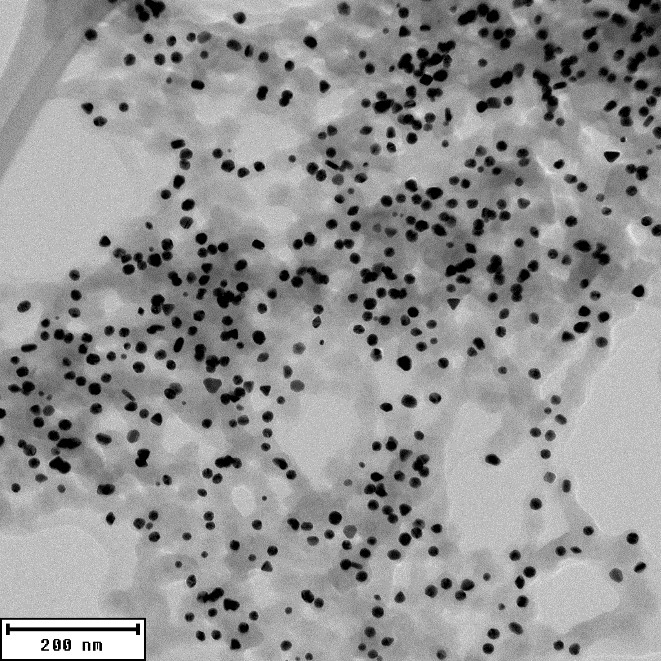
Ag nanoparticles formed via biosynthesis using extract from Vitis vinifera agriculture waste.
Microbial lipid production
Researchers: Irena Kolouchová, Assoc. Prof., PhD, Olga Maťátková, Assoc. Prof., PhD, in collaboration with Institute of Microbiology of the CAS, v. v. i.
Microorganisms produce lipids as storage compounds with triacylglycerols (TAGs) as their main constituents. Information about the exact composition of TAG mixtures is crucial for understanding their biosyntheses and their overproduction. The full characterization of the TAG fraction for an oil/fat requires the separation of all individual TAGs followed by the quantitation of separated species.
Many species of algae and cyanobacteria have the ability to produce substantial amounts (e.g., 20-50% of dry cell weight) of triacylglycerols as storage lipids. Cold- and hot-adapted microorganisms also have considerable potential in biotechnological applications because they accumulate large quantities of lipids and are able to regulate efficiently their lipid composition and adjust membrane fluidity.
Oleaginous bacteria that produce microbial oils in high quantities are able to accumulate TAGs under nitrogen starvation and are able to be cultivated on unusual carbon sources. Lipid hormones (lipokines) are fatty acids with many positive effects on human health. An important lipokine is palmitoleic acid (9-16:), which contributes to reduced inflammation, protection of the cardiovascular system, and inhibition of oncogenesis. Yeasts are attractive sources of palmitoleic and other beneficial fatty acids that are found in yeast cells either as polar lipids, i.e., phospholipids or glycolipids; or as neutral lipids, such as triacylglycerols.
- Possibilities of microbial lipid production by yeasts, bacteria and algae
- Potential production of essential fatty acids by microorganisms
- Production of specific fatty acids for the pharmaceutical and cosmetics industries
- Biodiesel production using yeast
- Study of lipids from extremophile microorganisms
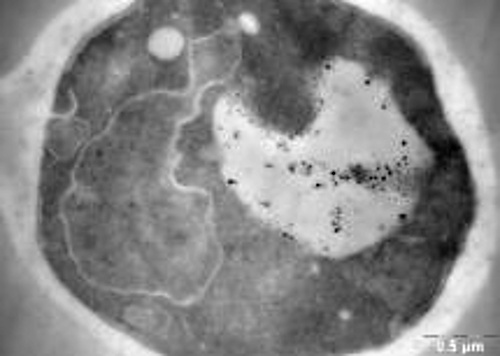
Vitis vinifera
doc. Ing. Irena Kolouchová, PhD., doc. Ing. Olga Maťátková, PhD., prof. Ing. Alena Čejková, CSc., spolupráce: EPS biotechnology s.r.o., Vinné sklepy Kutná Hora s.r.o., Vinselekt Michlovský a.s., Nové Vinařství a.s.
The grapevine (Vitis vinifera) is a important cultural crop, which has been domesticated as one of the first fruit crops. It is used both for direct consumption, for the production of raisins and for processing in the wine industry. Grapevine is a rich source of antioxidants and polyphenolic substances.
The physiological state of grapevines is influenced by many factors, including climatic conditions (biotic and abiotic stress) in a given year and by the vineyard treatment. All these factors have an impact on health of the plant, which also affects the grapes yield and the content of antioxidants. The stress response mechanisms of the plant include the synthesis and transport of antioxidants and production of secondary metabolites that are synthesized not only by the vine but also by its endophytic microflora. The physiological state of vine is also influenced by the use of spraying in viticulture, nowadays with more frequent use of natural products for the protection of the plant and the environment.
Wine production technology is one of the traditional biotechnologies that have been used since ancient times. Biotechnological approaches and possibilities are now changing, both in the terms of new developments in the grape processing technology or filtration, but also in terms of new yeast strains with improved properties, used for the must fermentation.
Food manufacturers have an increasing interest in the benefits stemming from the presence of various nutritional compounds in their products. These include polyphenol antioxidants, such as resveratrol. Bioavailability is a limiting factor in the uptake of polyphenol compounds, which often originates in their limited solubility in water solutions. Interesting sources of polyphenol antioxidants include wine. The legislative requirements for wine production are such, that the increase in the content of nutritionally beneficial substances can only by done by the means of modification of the technology production.
- Development of new technologies of wine production with increased content of biologically active substances
- Development of technologies for production of low-alcohol and non-alcoholic wine drinks with biologically active substances and antioxidants
- Possibilities of using wine waste as a source of biologically active substances
- New ways of vine protection in organic agriculture
- New technologies of wine drinks production
- Changes in the endophytic microflora population during the growth of vine during the year and in the response to stress
- Biotechnologically interesting products of the endophytic fungi associated with grapevine
Spirits technology
doc. Ing. Irena Kolouchová, PhD., doc. Ing. Olga Maťátková, PhD.
The manufacture of fruit spirits belong to the traditional biotechnologies. Like wine making, fruit spirits have been produced since antiquity. At present, the view towards the traditional production is changing, in particular with regard to the use of pure yeast cultures for the fermentation. Correct fermentation technology and the subsequent distillation can significantly improve the quality of the resulting product, and even the production yield can be increased.
- Influence of fermentation and distillation technology on analytical and sensory quality of spirits
